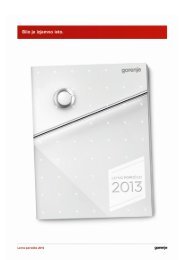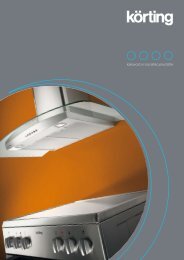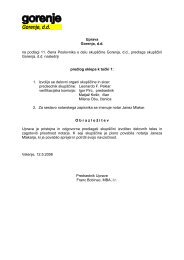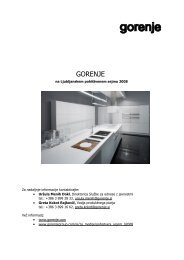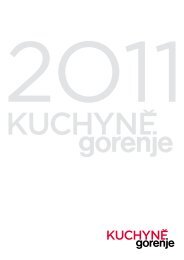ANNUAL REPORT 2008 - Gorenje Group
ANNUAL REPORT 2008 - Gorenje Group
ANNUAL REPORT 2008 - Gorenje Group
You also want an ePaper? Increase the reach of your titles
YUMPU automatically turns print PDFs into web optimized ePapers that Google loves.
95<br />
• Revised IAS 23 Borrowing Costs (effective as from 1 January 2009) removes<br />
the option to expense borrowing costs and requires that an entity capitalise<br />
borrowing costs directly attributable to the acquisition, construction or production<br />
of a qualifying asset as part of the cost of that asset.<br />
The revised IAS 23 will become mandatory for the <strong>Group</strong>’s 2009 financial<br />
statements and will constitute a change in accounting policy for the <strong>Group</strong>. In<br />
accordance with the transitional provisions the <strong>Group</strong> will apply the revised IAS<br />
23 to qualifying assets for which capitalisation of borrowing costs commences<br />
on or after the effective date.<br />
• Amendments to IFRS 2 Share-based Payment (effective as from 1 January<br />
2009) The amendment clarifies the definition of vesting conditions and introduces<br />
the concept of non-vesting conditions. Non-vesting conditions are to<br />
be reflected in grant-date fair value and failure to meet non-vesting conditions<br />
will generally result in treatment as a cancellation.<br />
• Amendments to IFRS 2 are not relevant to the <strong>Group</strong>’s operations as the<br />
<strong>Group</strong> does not have any share-based compensation plans.<br />
• Amendments to IAS 1 Presentation of Financial Statements (effective as<br />
from 1 January 2009) The amended standard requires information in financial<br />
statements to be aggregated on the basis of shared characteristics and introduces<br />
a statement of comprehensive income. Items of costs and expenses and<br />
components of other comprehensive income (effectively combining the income<br />
statement and all non-owner changes in equity in a single statement), or in two<br />
separate statements (a separate income statement followed by a statement of<br />
comprehensive income).<br />
• The <strong>Group</strong> will prepare two separate statements in the consolidated financial<br />
statements for 2009.<br />
• Amendments to IAS 27 Consolidated and Separate Financial Statements<br />
(effective as from 1 January 2009)<br />
The amendments remove the definition of “cost method” currently set out in<br />
IAS 27, and instead require all dividends from a subsidiary, jointly controlled entity<br />
or associate to be recognised as income in the separate financial statements<br />
of the investor when the right to receive the dividend is established.<br />
• Amendments to IAS 27 are not relevant where these refer to the consolidated financial<br />
statements of the <strong>Group</strong>.<br />
• They will, however, have the impact on the individual financial statements as the<br />
dividends will be recognised prior to the actual dividend payout.<br />
• Amendments to IAS 32 Financial Instruments: Presentation, and IAS 1<br />
Presentation of Financial Statements (effective as from 1 January 2009)<br />
• The amendments introduce an exemption to the principle otherwise applied<br />
in IAS 32 for the classification of instruments as equity; the amendments allow<br />
certain putt-able instruments issued by an entity that would normally be classified<br />
as liabilities to be classified as equity if, and only if, they meet certain conditions.<br />
• The amendments are not relevant to the <strong>Group</strong>’s consolidated financial statements<br />
as none of the <strong>Group</strong> companies issued any putt-able instruments in the<br />
past.<br />
• IFRIC 13 Customer Loyalty Programmes (effective as from 1 July <strong>2008</strong>)<br />
• It addresses the accounting by entities that participate in customer loyalty programmes<br />
for their customers. It relates to customer loyalty programmes under<br />
which the customer can redeem credits for awards such as free or discounted<br />
goods or services.<br />
IFRIC 13, which becomes mandatory for the <strong>Group</strong>’s 2009 financial statements,<br />
is not expected to have any impact on the consolidated financial statements.



